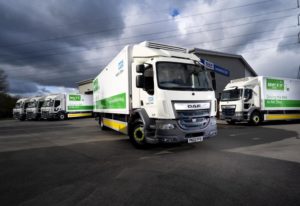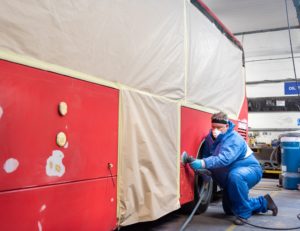
The recently published research is further evidence of the sector’s commitment to delivering UK net zero targets – despite the higher energy demands of EV output at present, efforts to drive efficiencies and use more green energy are having a significant impact, with CO2 emissions down by nearly 17,700 tonnes compared with 2021 – the equivalent annual carbon reduction of more than 800,000 trees.
These savings were delivered in part by growth in green tariff energy use, while manufacturers themselves generated some 4.7% more renewable energy than last year thanks to continued investment in on-site green infrastructure, delivering a total of 46GWh – enough to produce up to 767,000 EV batteries a year.
At the same time, manufacturers have further streamlined their recycling and reuse, with the average amount of waste per vehicle down by more than a third (-37.0%).
It is clear that Britain is scaling up its EV output, but battery production is lagging behind, with up to 90GWh of gigafactory capacity needed by 2030 to meet the UK’s EV manufacturing needs.
With various factors affecting investment decisions, involving many stakeholders, SMMT has set out an industrial strategy that calls for a range of measures, including major investment in more affordable, renewable energy supply in the UK.
The sector’s historic excellence, combined with its highly skilled workforce and undoubted R&D capability, can help make it one of the top global locations for producing zero emission vehicles.
Against a backdrop of increasingly fierce competition for investment and the need for industrial security provided by domestic battery production capacity, Britain urgently needs a plan to grow its supply of low cost, low carbon energy.
This is essential not just for manufacturing competitiveness but also for EV drivers, who must be confident that they can cost-effectively charge an EV with green energy – a vital step to accelerating uptake.
Mike Hawes, SMMT Chief Executive, said: “Britain’s automotive industry is building record numbers of zero emission vehicles while cutting its carbon footprint to a record low. This double success has been delivered thanks to huge investments from manufacturers to decarbonise both their facilities and vehicles.
“As demand for electric vehicles continues to grow at home and overseas, the UK can distinguish itself as a low-carbon manufacturing nation – but this depends on critical investment in gigafactories and the affordable, renewable energy needed to power them. The sector has made huge strides in recent years but there is much more to be done.”
Since Europe’s first mass market EV entered production in the UK in 2011, manufacturers have allocated some £11 billion in long-term commitments to deliver zero emission vehicles and decarbonise production facilities.
Recent sustainability investments in automotive manufacturing, included in the Sustainability Report, range from green technology innovations to solar panel sites and production efficiencies.
These include:
Michelin
Michelin has unveiled tyres for use on buses containing 58% of sustainable materials.
Approved for road use, these tyres have performance levels exactly in line with the manufacturer’s conventional tyres.
Michelin has also taken a new step towards the pre-production and marketing – within two to three years – of new ranges that will include high levels of sustainable materials.
The group is therefore on target to meet its commitment to global production with 100% bio-sourced, renewable or recycled materials by 2050, with an interim target of 40% for 2030.
According to Michelin, this progress is due to the increased use of natural rubber, together with the inclusion of recycled carbon black, oils such as sunflower oil and bio-sourced resins, silica from rice husks and even recycled steel in its tyres.
In addition, care is taken not to impact the environment in each of the steps in the life cycle – design, manufacture, transport, use and recycling.
To stick to its road map, Michelin can rely on its expertise in the field of high-tech materials, along with the contribution of all of the 6,000 engineers, researchers, chemists and developers in its R&D department
Leyland Trucks
In what was one of the largest and most significant deployments of zero emission trucks in the UK last year, 20 DAF LF Electric vehicles entered service with a range of public bodies including the NHS and Local Authorities, as part of the Battery Electric Truck Trial (BETT) funded by the Department for Transport.

One of the key operators in partnership with BETT is NHS Supply Chain, which, supported by financing and maintenance services from Prohire, is deploying eight DAF LF Electric rigids with refrigerated bodies in several of its locations around the country.
BETT is valued at £10 million and focuses on an end-to-end solution, covering vehicles, charging infrastructure, user training, repair and maintenance as well as total-cost-of-ownership, providing operational insight across a variety of duty cycles.
It is part of the Government’s wider £20 million Zero Emission Road Freight Trial and is delivered using the SBRI (Small Business Research Initiative).
Lancashire-based Leyland Trucks – where the LF Electric is manufactured – is working with CENEX, the low carbon research and consultancy organisation, to create the interactive BETT report and website.
Scania
Eurocentral, in Motherwell, is the jewel of Scania UK’s network and sets the standard for what a future modern heavy transport service centre needs to be.
The L-shaped building, split into two wings, allows the team to service all of Scania’s vehicles from conventional combustion engines to gas and electrified vehicles, safely.
Installation of LED lighting is energy efficient and also gives the team a bright environment to work in, as do the glass panels on the workshop doors, designed to draw in as much natural light as possible.
The building’s air-sourced underfloor heating, HVAC system and thermal efficiency provide effective temperature control, even when any of the 27 large, 25 sqm doors are open.
Powering the facility are several green sources, from the photovoltaic panels on the roof to fossil-free generated electricity, something every Scania UK owned site has done since 2017.
Scania UK also future-proofed the electrical input into the 7.8 acre plot by installing 950 kVA of power on site, with 350 kVA allocated to install future EV charging locations around the vast yard.
The site also sustainably redistributes surface water from the yard via permeable paving in the car park and an urban drainage system. Captured rainwater is used to supply the wash bay area.
Alexander Dennis
The Scottish bus manufacturer formed a cross-functional Energy Governance Committee in 2022, made up of representatives from across the business, including HR, procurement, aftermarket and operations.
Due to the importance of ESG to Alexander Dennis, the committee meets monthly to deliver more efficient energy use and identify initiatives for further energy reductions through collaboration.
Initiatives to date include office space consolidation, reviewed shift patterns and evaluating the efficiency of paint operations.
Looking to individual company site operations, facilities managers follow a continuous improvement model.
Their local experts use power analysis equipment and sub-metering to identify further energy reduction opportunities across Alexander Dennis’s operations including replacing inefficient lighting systems with LEDs and monitoring heavy machinery efficiency, such as CNC and paint ovens.
Since the implementation of the committee, Alexander Dennis has made savings of more than 400,000KWh.

Based on CIBSE TM46, this allows for ongoing energy reduction targets to be set. The framework will also allow for frequent analysis of energy consumption, facilitate their continuous improvement model and improve future forecasting.
Read the SMMT’s Sustainability Report in full here.








